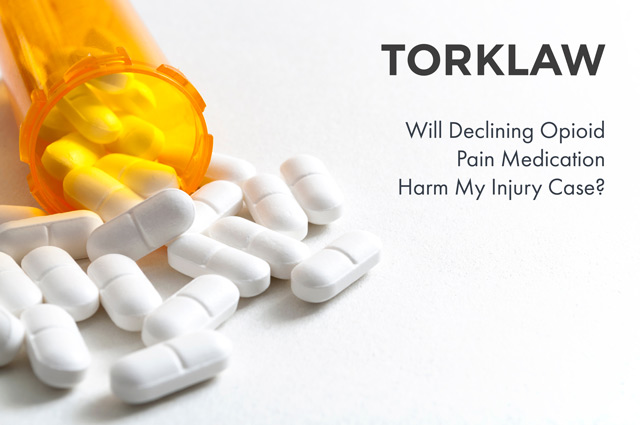Given the current epidemic of opioid addiction in the United States, people experiencing pain from injuries or other medical conditions may be seeking alternative pain management treatments. Unfortunately, medical prescriptions are often used to quantify damages for pain and suffering in personal injury cases. If you’ve received a painful accident injury and want to avoid opioid pain medication, you may wonder if this will harm your case.
About Opioid Pain Medication
Opioid medications include codeine, fentanyl, hydrocodone, morphine and oxycodone. When used for a short time as prescribed for a physician, they are generally safe and effective at treating pain. The chemicals in these medicines attach to receptors on nerve cells. By mimicking opioid neurotransmitters that are naturally created by our bodies, they block pain.
However, unlike natural neurotransmitters, these chemical messengers flood the nervous system with dopamine, overstimulating our brain’s reward system with feelings of pleasure. This can lead to addiction, accidental overdose, and death.
The frightening statistics:
- According to the United States National Institutes for Health (NIH), up to 29 percent of patients who are prescribed opioids for chronic pain misuse them.
- About 5 percent of people who misuse prescription opioids eventually start using heroin.
- NIH reported that there were more than 47,000 deaths in the U.S. that resulted from opioid overdoses in 2017.
- The Centers for Disease Control and Prevention (CDC) says that on average,130 people die each day from an opioid overdose.
- In a 2018 American Psychiatric Association national poll, 31% of participants said they knew someone who is or has been addicted to opioids.
The pharmaceutical industry played a role in this crisis. In the late 1990s, they began aggressively marketing opioid medicines, assuring physicians that they were safe and non-addictive. One such example is Purdue Pharma, maker of OxyContin, a pain management drug whose single active ingredient is oxycodone.
Starting in 1996, Perdue Pharma sales representatives heavily promoted OxyContin to physicians with written promotional materials and in oral claims that patients were less likely to abuse it than other oxycodone-based pain medicine.

We know now that claim was entirely false. Scores of lawsuits against Perdue Pharma followed, and in 2019, the company filed for bankruptcy.
But the damage was done. Between 1999 to 2017, more than 702,000 people died from opioid overdoses.
Reasons People May Decline Opioid Medication to Treat Pain
Given how deadly addiction to opioid pain medication can be, it’s no wonder that many people who have suffered an accident injury may want to avoid taking them. Some patients may have additional reasons to decline opioids, such as:
- Previous addiction issues, either to opioids or other forms of substance abuse, such as alcohol or nicotine
- Witnessing the addiction or overdose death of a close friend or family member
- Injured patients may have young children or others who rely on them for care, so they need to stay alert.
Additionally, in their 2016 “Guideline for Prescribing Opioids for Chronic Pain,” the CDC urged practitioners to avoid prescribing high opioid doses for new patients, and conduct risk/benefit reviews on existing opioid patients.
This guideline has been controversial. While meant to guide doctors in mitigating addiction risk, too many people in the healthcare industry, including insurers, have interpreted as a mandate to strictly limit prescribing opioids. Increasingly, physicians are avoiding long-term treatment with opioids, and may cut patients off after a period of time.
Talk to Your Lawyer about Why You’re Choosing to Refuse Opioids
The way patients decide to manage their pain shouldn’t make a difference in a personal injury case. Unfortunately, when a plaintiff declines pain-killing drugs, it does provide an opening for defense counsel to say they must not be in serious pain.
- A skilled plaintiff’s attorney will be able to rebut this argument in several ways.
- Plaintiff’s testimony during a deposition and/or a trial regarding his or her decision to decline opioids
- Records of prescriptions for non-opioid pain relief medicines
- Testimony from the plaintiff’s healthcare provider or other witnesses who can testify about the patient’s pain and its impact
- A “pain journal” or written record the plaintiff keeps regarding his/her pain and its impact
- Treatment plans for alternative pain management methods, such as physical therapy, acupuncture, chiropractic, biofeedback, meditation or yoga

Overall, if you have been injured in an accident and are pursuing a personal injury claim, it is vital to maintain consistent communication with both your healthcare providers and your lawyer. Document everything about your injuries, including your pain and ongoing treatment, whatever form that may take.
Your Pain Management Is Your Choice
If you are in pain due to an accident injury, you should feel confident in choosing whatever pain management strategy you and your doctor feel is right. And your personal injury attorney should back you up 100%
At TorkLaw, declining opioid pain medication will not jeopardize your personal injury case. Our personal injury attorneys will support you with excellent representation and build a strong case regardless of your pain management decision.
Did you find this post informative? You may also want to check out the below content:



